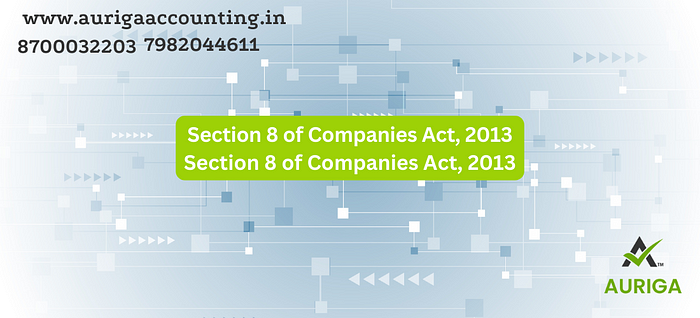
Section 8 of the Companies Act, 2013 focuses on the establishment of non-profit organizations in India. Enacted by the honorable Parliament of India, the Companies Act, 2013 serves as a comprehensive legislation, supplanting the preceding Companies Act of 1956. This legislation provides a thorough framework for the incorporation of diverse company types, including Private Limited, Public Limited, Non-Profit Organizations, Limited Liability Partnerships (LLP), One Person Companies (OPC), and others. Specifically, Section 8 of the Companies Act, 2013 delineates the provisions and procedures for incorporating non-profit entities such as NGOs, trusts, and societies.

What is Section 8 of Companies Act, 2013
Section 8 of the Companies Act, 2013 is exclusively dedicated to the registration and incorporation of non-profit organizations, including NGOs, trusts, and societies at the central level. For a comprehensive understanding of the provisions outlined in Section 8, it is recommended to refer to the official PDF document on Section 8 of the Companies Act, 2013 issued by the Ministry of Corporate Affairs. To establish a non-profit organization, one can undergo the registration process for a Section 8 company under the Ministry of Corporate Affairs.

Companies that are incorporated under Section 8 of Companies Act, 2013
Entities incorporated under Section 8 of the Companies Act, 2013 primarily comprise non-profit organizations committed solely to the well-being of the broader community. Their core purpose is not profit generation through any form of transaction.
Section 8 companies are established to raise awareness about various societal issues and to foster welfare in diverse areas such as sports, education, science, art, research, technology, literature, and awards, among others. Importantly, the founders and shareholders of a Section 8 company are prohibited from distributing profits and dividends among themselves.

Characteristics of Section 8 Company
- Advancing Social Welfare — Established under the supervision of the Ministry of Corporate Affairs (MCA), a Section 8 company aims to contribute to the well-being of society by promoting various sectors, including education, agriculture, art and culture, technology, science, entrepreneurship, research, social welfare, charity, religious programs, and more. Its primary objective is to work exclusively for the benefit of the community, devoid of any profit generation or the distribution of profits and dividends among its members.
2. Absence of Minimum Capital Requirement — Unlike other company types, a Section 8 company is not bound by any minimum paid-up share capital requirement.
3. Government Authorization — Incorporated under Section 8 of the Companies Act, 2013, a Section 8 company operates under the governance of the Ministry of Corporate Affairs, emphasizing its dedicated role in societal welfare.
4. Limited Liability Protection — Members of a Section 8 company enjoy limited liability, restricting their financial responsibility to the extent of their subscribed capital and shares. This safeguard ensures that personal assets remain unaffected and are not utilized to cover the company’s losses.
5. Dividend Restraints — Sharing dividends and profits among members or shareholders is explicitly prohibited in a Section 8 company, aligning with its non-profit ethos.
6. Naming Conventions — A Section 8 Company is restricted from using terms such as “private limited” or “limited company” in its name. Instead, it is permitted to employ suffixes like foundation, federation, council, organization, and confederation, reflecting its non-profit nature.

Documents requirement for a section 8 company registration
As per the Companies Act, 2013, the companies need to provide legit proof of identity and address proof as part of the registration process.
Identity and Address proof of directors
- Adhar Card
- Driving License
- PAN Card / DIN( Directors Identification Number)
- Email address and Mobile Number
- Utility bills ( such as electricity bills, broadband bills, etc)
- Latest Bank statements ( not older than 2 months)
Address proof of Registered Office
- Latest utility bill (Electricity/broadband/ mobile bill )
- Rent agreement
- Obtain No objection certificate( NOC) from the land owner

Section 8 Company Registration Fees
The total fees for section 8 company registration as an NGO starts from Rs 4,999 including Govt and professional charges and it takes around 7–10 working days to get your NGO incorporated.

Time required for section 8 company registration process
Usually, it takes around 7–10 working days to register a Section 8 company under the Companies Act, 2013. The time required is due to the documents being verified and processed by the Ministry of Corporate Affairs( MCA).

Section 8 Company Registration Fees and Time Required
To register a Section 8 company, an individual needs to pay the required government fee, as well as some professional fees which you need to pay to the lawyer or the professional you are hiring to get your Section 8 Company incorporated. At Auriga Accounting, you can get your Section 8 Company incorporated at a very low fee starting at just Rs 4,999 and it can be incorporated within 7–10 working days.

